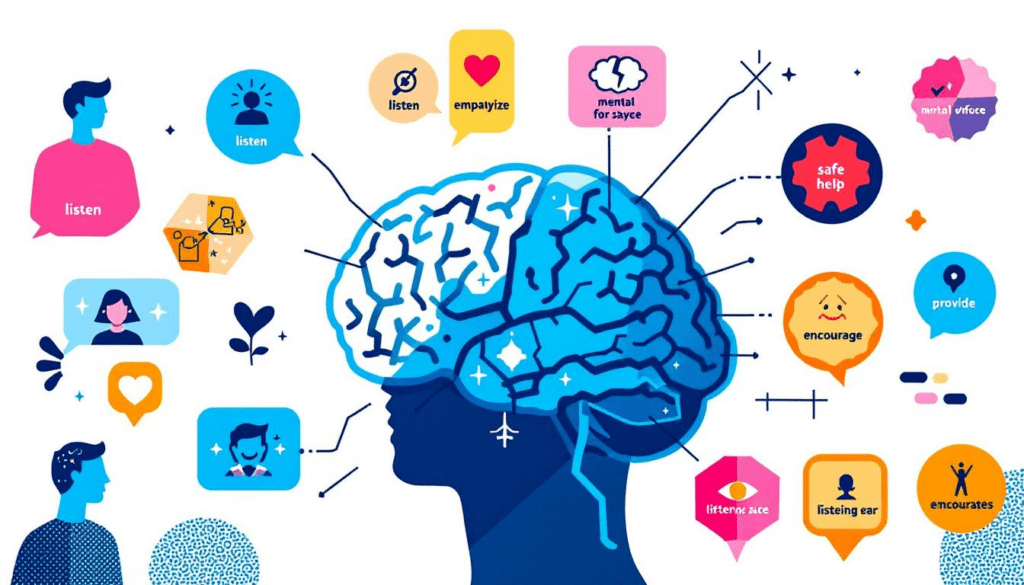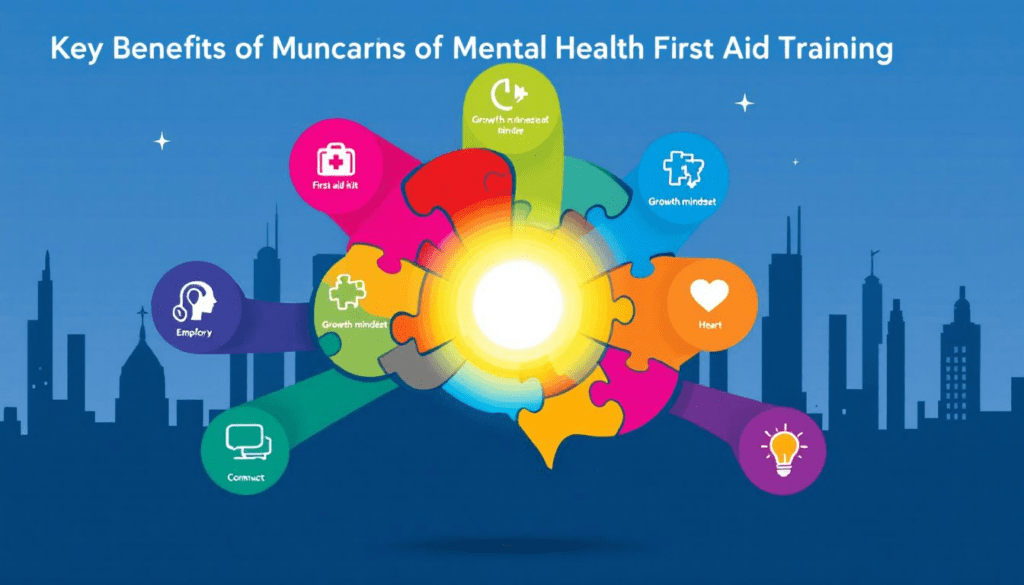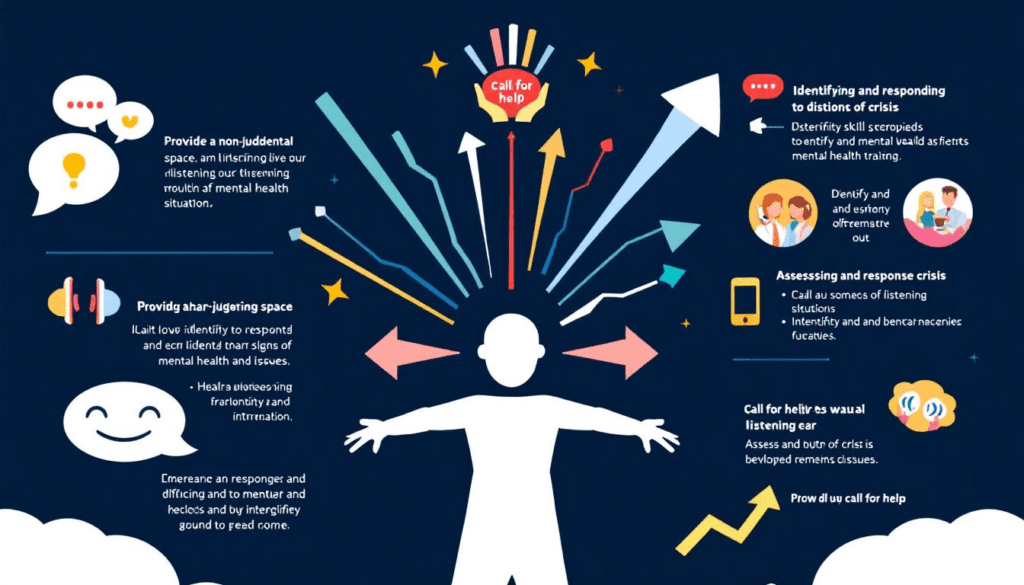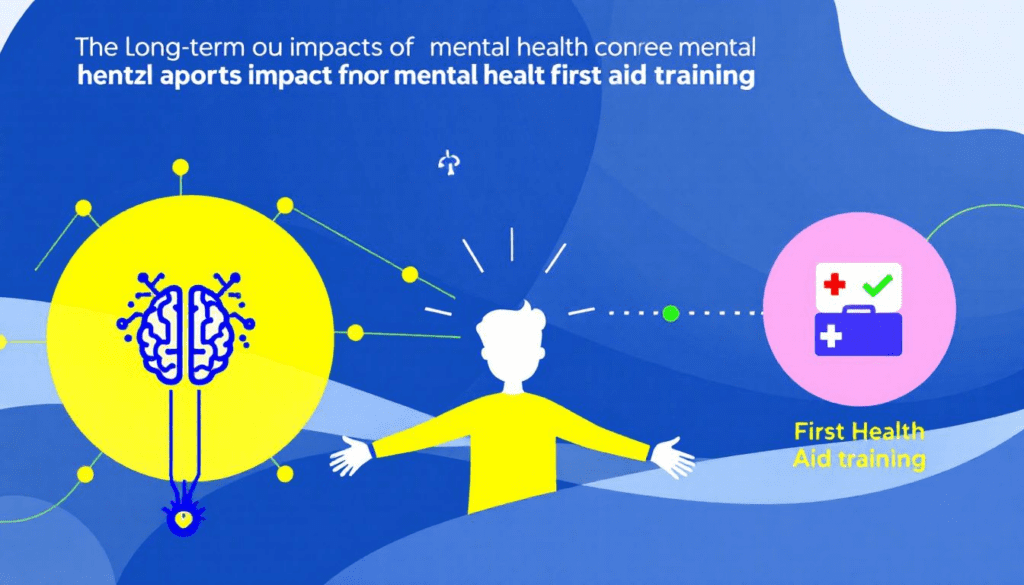- Key Takeaways
- Mental health and work
- Understanding Mental Health First Aid
- Key Benefits of Mental Health First Aid Training
- Building a Supportive Work Environment
- Developing Essential Skills Through Training
- Implementing Mental Health First Aid Training in Your Organisation
- Long-Term Impact of Mental Health First Aid Training
- Summary
- Frequently Asked Questions
Curious about how mental health first aid training can transform your workplace? This training equips employees to support colleagues facing mental health challenges, leading to improved well-being, reduced stigma, and enhanced productivity. Discover the substantial benefits of mental health first aid training and how it can create a more supportive and effective work environment.
Key Takeaways
- Mental health first aid training equips employees with skills to provide initial support during mental health crises, fostering a culture of empathy and understanding in the workplace.
- The training significantly enhances employee well-being, reduces stigma around mental health issues, and improves overall productivity, leading to a healthier work environment.
- Implementing mental health first aid training promotes open communication, recognition of mental health signs, and connection to professional help, resulting in a supportive and resilient workforce.
Mental health and work
- Stress, depression or anxiety and musculoskeletal disorders accounted for the majority of days lost due to work-related ill health in 2023/24, 16.4 million and 7.8 million respectively. ( Source HSE 2024)
One in four people in the UK will have a mental health problem at some point. While mental health problems are common, most are mild, tend to be short-term and are normally successfully treated, with medication, by a GP. (Source HSE 2024)
Mental health is about how we think, feel and behave. Anxiety and depression are the most common mental health problems. They are often a reaction to a difficult life event, such as bereavement, but can also be caused by work-related issues.(Source HSE 2024)
Work can also aggravate pre-existing conditions, and problems at work can bring on symptoms or make their effects worse.(Source HSE 2024)
Whether work is causing the health issue or aggravating it, employers have a legal responsibility to help their employees. Like any other safety or health hazard at work, work-related mental health issues must be assessed to measure the levels of risk to staff. Where a risk is identified, steps must be taken to remove it or reduce it as far as reasonably practicable.(Source HSE 2024)
Some employees will have a pre-existing physical or mental health condition when recruited or may develop one caused by factors that are not work-related factors.(Source HSE 2024)
Employers may have further legal requirements to make reasonable adjustments under equalities legislation.(Source HSE 2024)
Understanding Mental Health First Aid

Mental health first aid is a transformative tool that equips individuals with the skills to offer initial assistance to those experiencing mental health issues. It is not a replacement for professional mental health care but serves as a crucial first step in providing support during a mental health crisis. Integrating mental health considerations into workplace health and safety assessments helps organisations treat mental health with the same importance as physical health.
Mental health first aid training is essential in the workplace to provide initial support during mental health crises and to foster a culture of understanding and empathy. This training helps employees recognise the signs of mental distress and offers them the tools to support their colleagues until professional help is available.
Understanding what mental health first aid entails and the role of a mental health first aider is essential.
What is Mental Health First Aid?
Mental Health First Aid (MHFA) is a program designed to provide support and guidance to individuals experiencing mental health issues. The main goal is to assist individuals in distress. This support continues until they are able to access professional mental health treatment. This training equips participants with the knowledge to offer initial support, emphasising the importance of recovery and resilience. The belief that individuals can get better and use their strengths to stay well is central to MHFA.
A Mental Health First Aid course prepares individuals to support those around them, fostering an inclusive workplace culture. Early identification of mental health issues through MHFA contributes to better employee retention and a healthier work environment.
The First Aid at Work Regulations updated in 2024 now require employers to include assess the need for provision of mental health first aid as part of their risk assessments.
The Role of a Mental Health First Aider
A Mental Health First Aider plays a crucial role in the workplace by providing initial support to individuals experiencing mental health issues. They are trained to recognise signs of distress, offer guidance, and facilitate access to professional help when necessary. During a mental health crisis, they may provide immediate assistance, contact emergency services, and ensure the safety of the individual in distress.
In addition to providing early intervention, Mental Health First Aiders promote mental health awareness by encouraging non-stigmatising conversations and fostering an open dialogue about mental health issues. While they are not substitutes for mental health professionals, their early intervention and support are vital in creating a supportive network within the organisation.
Key Benefits of Mental Health First Aid Training

Mental health first aid training offers many benefits that extend beyond individual well-being to improve overall workplace dynamics. From enhancing employee well-being to reducing stigma, boosting productivity, and lowering absenteeism and turnover rates, the positive impacts are substantial.
These benefits can be explored in detail.
Enhancing Employee Well-being
Mental health first aid training significantly improves employee well-being by enhancing job satisfaction, creativity, and morale. It equips employees with practical strategies for effective stress management, helping them navigate common mental health issues such as stress, anxiety, depression, and burnout. Immediate support provided through this training ensures that employees facing mental health difficulties receive the help they need promptly.
Prioritising mental health in the workplace fosters a safe working environment where employees feel valued and supported. This positive atmosphere leads to higher job satisfaction and a more engaged workforce, ultimately contributing to the overall success of the organisation.
Reducing Stigma Around Mental Health Issues
One of the key benefits of mental health first aid training is its role in reducing stigma around mental health issues. By encouraging open discussions about mental health, the training normalises the conversation and helps employees feel more comfortable seeking help. This shift in culture is crucial for creating a supportive work environment where mental health is openly addressed and understood.
Training fosters empathy by equipping employees to challenge stereotypes and support colleagues facing mental health challenges. As a result, relationships and morale improve, leading to a more compassionate and cohesive workplace.
Improving Workplace Productivity
Investing in employee mental health is beneficial. First-aid training results in happier, more engaged, and productive individuals. Poor mental health can significantly affect overall team and company performance, making it essential to address mental health challenges proactively. Mental health issues, such as stress and anxiety, can hinder concentration, decision-making, and overall performance.
By raising awareness of mental health issues and providing the tools to manage them, training enhances overall performance and productivity in the workplace. Employees feel more supported and are better equipped to handle their responsibilities, contributing to a more efficient and effective work environment.
By recognising and supporting employees facing mental health challenges, organisations can create a more stable and productive work environment. Reduced turnover leads to cost savings. This includes savings from recruitment, training, and onboarding processes, which ultimately benefit the organisation.
Building a Supportive Work Environment

Creating a supportive work environment is a fundamental aspect of implementing mental health first aid training. This training promotes a culture where well-being is prioritised and employees feel valued and supported.
Promoting open communication and encouraging empathy are key factors in building such an environment.
Promoting Open Communication
Open communication in the workplace fosters a sense of community and support among employees. Mental health first aid training teaches individuals how to listen, validate, and provide support to colleagues, reducing stigma and encouraging open conversations about mental well-being.
Educational sessions or workshops on mental health topics can raise awareness among colleagues and create a positive work environment. A non-judgmental attitude is essential for fostering an open environment for conversations about mental health, leading to a more connected and supportive workplace community.
Encouraging Empathy and Understanding
Mental health first aid training helps employees develop empathy and understanding, which are crucial for creating a supportive workplace. Participants learn to notice behavioural changes that may signal mental health issues and identify early indicators of conditions like stress, depression, and anxiety.
Techniques such as active listening and demonstrating empathy are emphasised, enabling employees to provide effective initial support. By promoting empathy and understanding, the training contributes to better teamwork, morale, and a more inclusive work environment.
Developing Essential Skills Through Training

Mental health first aid training develops essential skills that are invaluable in the workplace. These skills include recognising signs of mental ill health, providing initial support, and connecting individuals to qualified mental health professional help.
Exploring these skills in more detail reveals their importance.
Recognising Signs of Mental Ill Health
Participants in mental health first aid training develop the skills to recognise various mental health conditions, including changes in behaviour, mood, or performance that may indicate a mental health concern. This early recognition is crucial for providing timely support and fostering a resilient workforce.
Training equips employees with the ability to identify mental health triggers and signs, which is essential for early intervention and support. By recognising these signs, employees can take appropriate action to support their colleagues and maintain a healthy work environment.
Providing Initial Support
Mental health first aid training encourages employees to engage in supportive conversations and apply the Mental Health First Aid action plan in various situations. Offering initial support involves creating a safe, non-judgmental space where individuals feel comfortable sharing their concerns.
This initial appropriate support is crucial for enhancing workplace resilience, as it equips employees with the tools to manage stress effectively. By providing this support, employees can help their colleagues navigate challenging times and promote overall well-being.
Connecting to Professional Help
Mental Health First Aiders play a vital role in guiding employees to appropriate professional help, such as Employee Assistance Programmes (EAPs) or community resources. Training equips employees with strategies and coping mechanisms to manage stress effectively, ensuring they receive the professional support they need.
Implementing Mental Health First Aid Training in Your Organisation
Introducing mental health first aid training in an organisation nurtures talent, ensures employee well-being, and attracts prospective candidates.
Guidance on choosing the right training programme and supporting trained employees follows.
Choosing the Right Training Programme
When choosing a mental health first aid training program, it’s essential to find a reputable programme that aligns with your organisation’s needs and goals. The Mental Health First Aider course typically lasts two days and is led by a highly qualified instructor
Presentations, interactive discussions, and group activities are also part of the training, ensuring participants are well-prepared to provide mental health support in their workplace. By selecting the right programme, organisations can ensure their employees are equipped with the necessary skills to support their colleagues effectively. At Solutions we are unique as we provide a trained actor for delegates to assess and support in life like scenarios.
Supporting Trained Employees
Providing ongoing support to mental health first aiders is crucial to maintain their effectiveness and promote a healthy workplace environment. Regular check-ins, access to resources, and opportunities for further development are important types of support for mental health first-aiders.
This ongoing support translates to an empowered workforce capable of addressing mental health challenges effectively. By fostering a strong network of advocates, organisations can ensure their employees receive the support they need to thrive.
Long-Term Impact of Mental Health First Aid Training

The long-term impact of mental health first aid training is profound, with benefits extending far beyond immediate support. This training can significantly reduce employers’ losses, improve productivity, and cultivate a thriving workforce.
The impact of fostering resilience and enhancing problem-solving skills contributes significantly to the long-term benefits.
Fostering Resilience
Mental health first aid training enhances employees’ ability to cope with stressors and adapt to challenges, contributing to overall workplace resilience. This resilience is crucial for maintaining employee well-being and effectively addressing stress and mental health challenges. The outcomes include reduced burnout, improved teamwork, and a more supportive work culture.
By fostering resilience, organisations can ensure that their workforce remains strong and capable of handling the pressures of the modern work environment. This resilience not only benefits individual employees but also contributes to the overall success and stability of the organisation.
Enhancing Problem-Solving Skills
Mental health first aid training significantly improves employees’ problem-solving and decision-making abilities. These skills are essential in the workplace, contributing to effective decision-making and navigating complex situations. With improved skills, employees can make more informed and empathetic decisions when addressing mental health concerns.
Enhanced problem-solving skills lead to a more resilient workforce capable of effectively managing challenges and supporting each other. This creates a work environment where employees feel empowered and equipped to handle any issues that arise, fostering a culture of support and collaboration.
Summary
Mental health first aid training offers numerous benefits that extend beyond individual well-being to improve overall workplace dynamics. By enhancing employee well-being, reducing stigma, improving productivity, and lowering absenteeism and turnover rates, this training creates a supportive and resilient work environment. Implementing mental health first aid training in your organisation is crucial for nurturing talent and ensuring employee well-being.
The long-term impacts of this training, including fostering resilience and enhancing problem-solving skills, contribute to a thriving and productive workforce. By investing in mental health first aid training, organisations can create a culture where mental health is prioritised and employees feel valued and supported. Take the first step towards a healthier workplace by implementing mental health first aid training in your organisation today.
Solutions Training is committed to delivering high-quality, impactful mental health training tailored to diverse needs. Whether you’re looking to implement mental health first aid in the workplace, schools, or your local community, their expert trainers ensure you leave with the confidence and skills to make a difference.
Investing in mental health training is an investment in people’s well-being and the long-term success of organisations and communities. To learn more about Solutions Training’s programmes and how to get started, visit our website today. Together, we can build a world that truly prioritises mental health.


